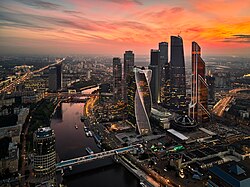  | |
| Political | |
|---|---|
| Places | |
| People | |
| Miscellaneous | |
This article lists songs about Moscow, which are either set there or named after a location or feature of the city. As some songs are written without lyrics, the following list arrange them not by language, instead, the list is arranged by the song's release country or by the base of its singers, both of which designates the song's targeted audience.
